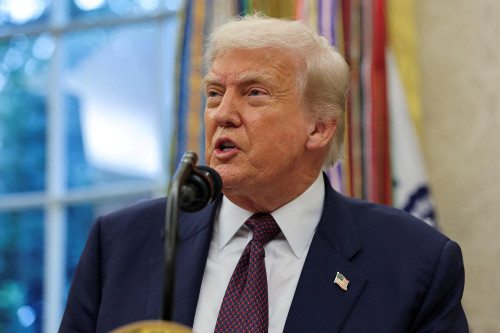By Saqib Iqbal Ahmed
NEW YORK (Reuters) -As U.S. President Donald Trump narrows his shortlist for the next Federal Reserve chair, investors and strategists are closely analyzing the range of possible market reactions to each potential nominee poised to replace Jerome Powell when his term is over.
Reactions may include a positive move if current Fed Governor Christopher Waller is picked, signaling continuity of leadership, to a possible negative response if the nominee to replace Powell is viewed as aligned with Trump, a situation that could call into question the independence of the central bank from the White House.
While Trump has for months flirted with ousting Powell, the unexpected announcement last week of Governor Adriana Kugler’s exit from the board has brought fresh attention to the composition and leadership of the monetary policy-making body.
Earlier in the week, Trump indicated he had a short list of four possible replacements for Powell, including economic adviser Kevin Hassett and former Fed governor and Trump supporter Kevin Warsh, and two other people.
On Thursday, Trump named Council of Economic Advisers Chairman Stephen Miran to serve out the rest of Kugler’s term, leaving the choice of a permanent replacement for a later date.
Bloomberg News on Thursday reported Waller is a top candidate for Fed chair within the Trump team, citing sources.
“After months of extensive telegraphing from the White House, investors have come to expect the next chair to be a Trump loyalist with an avowed dovish bias,” said Karl Schamotta, chief market strategist at Corpay in Toronto.
Online betting markets Polymarket and Kalshi on Thursday showed Waller, Hassett and Warsh among those most likely to replace Powell.
Broadly, the independence of the Fed remains the key issue for most investors and market reactions could vary depending on how closely prospective candidates to replace Powell are perceived to be aligned with Trump.
“President Trump will continue to nominate the most competent and experienced individuals to deliver on his pledge to Make America Wealthy Again. Unless it comes from President Trump himself, however, any discussion about personnel decisions should be regarded as pure speculation,” said White House spokesperson Kush Desai.
CONTINUITY SOUGHT
Markets were likely to react most favorably should Trump nominate Waller to Powell’s job, several investors said.
Waller, an advocate for an immediate interest rate cut, said last month he would accept the job as head of the U.S. central bank if asked by Trump.
In a statement following his dissenting vote against the Federal Open Market Committee’s decision to hold rates steady in July, Waller said the Fed’s ‘wait-and-see approach’ to monetary policy was “overly cautious.”
“Waller would probably represent the most continuity with the current style of Fed management,” said Steven Englander, head of global G10 FX research at Standard Chartered.
Guy LeBas, chief fixed income strategist at asset manager Janney Capital Management, said that, while there isn’t a strong market opinion of policy differences under a Waller and Warsh pick, Waller has been flexible and fast-moving in his time at the Fed and has largely defied any hawkish or dovish bias.
As such, should Trump seek to name him chair it would likely elicit a positive response from markets, said Mark Malek, chief investment officer of Siebert Financial.
The Federal Reserve declined to comment.
TRUMP ALIGNED
A potentially more negative reaction may come should the nominee to replace Powell be viewed as a Trump ally.
“The more the candidate is seen as being aligned with the White House, the more detrimental it is going to be to U.S. assets in general,” Felix Vezina-Poirier, strategist for BCA Research, said.
That means a Hassett nomination could spur a negative reaction with longer-term yields rising and the dollar selling off, analysts said.
With Hassett viewed as very closely aligned with the White House, his nomination would not bode well for the independence of the Fed, some analysts said.
A request for comment was sent to Hassett via the White House, but he did not respond immediately.
Warsh might also prompt some market worry, investors and analysts said.
Warsh, currently a visiting fellow at Stanford University’s Hoover Institution, was a Fed governor from February 2006 to April 2011, leaving about a year before Powell became a governor.
During his tenure at the Fed, Warsh was frequently an advocate for tighter, not easier, monetary policy and criticized the Fed’s expansionary balance sheet policy.
“With a long history of taking overtly political views on policy — especially in the opinion pages — former governor Kevin Warsh is more of a wild card,” Corpay’s Schamotta said.
“Although investors might welcome his recent Damascene conversion to lowering rates, it comes after years of criticising the Fed for keeping policy too loose, and has been paired with a commitment to reducing the central bank’s balance sheet more quickly—something that could push borrowing costs higher for an already-stretched government,” he said.
Warsh did not immediately respond to a request for comment.
Still, the biggest knock for markets could come if Trump were to nominate a candidate who is viewed as lacking Federal Reserve or economic experience.
Such a move would also raise questions about Fed independence, investors said.
“The more significant question is whether any of these Fed candidates would be more or less “captured” by fiscal interests from the White House,” LeBas said.
(Reporting by Saqib Iqbal Ahmed; Additional reporting by Lewis Krauskopf; editing by Megan Davies and Anna Driver)


